Ford Ecosport: Identification Codes / Description and Operation - Identification Codes
Vehicle Identification Number (VIN)
VIN Locator
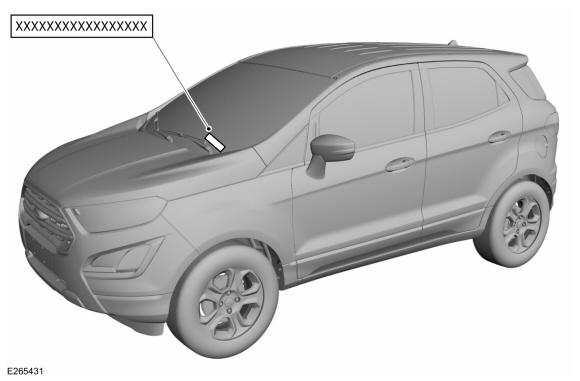
The VIN is a 17-digit combination of letters and numbers. The VIN is printed on a metal tab attached to vehicle and visible through the windshield lower left corner. The VIN is also found on the VC label located on driver's side B pillar lower. The codes stamped or printed on the VIN plate and labels during production enable the precise details of the vehicle build specification to be established. If the VIN plate requires replacement, authorized dealers must contact their respective regional office.
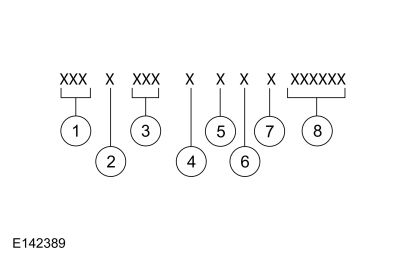
| Item | Description |
|---|---|
| 1 | WMI (World Manufacturer Identifier) |
| 2 | Restraint-type code |
| 3 | Vehicle line, series, body-type code |
| 4 | Engine-type code |
| 5 | Computer-generated check digit |
| 6 | Model year code |
| 7 | Assembly plant code |
| 8 | Production sequence number |
World Manufacturer Identifier
The first 3 VIN positions are the WMI (World Manufacturer Identifier).
- MAJ - Ford Motor Company, India, MPV (Multi-Purpose Vehicle) for USA and Canada
- MAJ - Ford Motor Company, India, Passenger Vehicle for Mexico market only
Restraint Type
The fourth VIN position is the vehicle restraint type code.
- 3 - 3,001-4,000 lb GVW rating, Active safety belts (all positions), driver and front passenger air bags and side impact inflatable restraints (1st and 2nd row),driver and passenger knee bolster
- 6 - 4,001-5,000 lb GVW rating, Active safety belts (all positions), driver and front passenger air bags and side impact inflatable restraints (1st and 2nd row), driver and passenger knee bolster
- B - Manual safety belts (all positions), driver and front passenger air bags, 1st row side impact inflatable restraints (Mexico market only)
- F - Manual safety belts (all positions), driver and front passenger air bags (Mexico market only)
Vehicle Line, Series and Body Type
Positions 5 through 7 indicate vehicle line, series and body type.
- S2F - Ecosport,FWD , 5-door hatchback - S
- S2G - Ecosport,FWD , 5-door hatchback - SE
- S2K - Ecosport,FWD , 5-door hatchback - Titanium
- S2M - Ecosport,FWD , 5-door hatchback - Trend (Mexico market only)
- S2N - Ecosport,FWD , 5-door hatchback - Titanium (Mexico market only)
- S3F - Ecosport,4WD , 5-door hatchback - S
- S3G - Ecosport,4WD , 5-door hatchback - SE
- S3J - Ecosport,4WD , 5-door hatchback - SES
- S3K - Ecosport,4WD , 5-door hatchback - Titanium
Engine Type
The eighth VIN position identifies the engine type, displacement and number of cylinders.
- E - 1.0L, (I3), GTDI (gasoline turbocharged direct injection)
- L - 2.0L, (I4), GDI (gasoline direct injection) (Mexico market only)
- S - 1.5L, (I3), PFI, Ti-VCT (Twin Independent Variable Cam Timing) (Mexico market only)
Check Digit
The ninth VIN position is a government-assigned, computer-generated check digit.
- 0 - 9
Model Year
The tenth VIN position is the model year code.
- M - 2021
Assembly Plant
The eleventh VIN position is the assembly plant code.
- C - Chennai Assembly Plant (FIPL), India
Production Sequence Number
The last 6 VIN positions are a numeric code for the vehicle build sequence. This is also the vehicle serial and warranty number. The serial number can also be found on the engine block, transmission and frame.
- 000,000 - 999,999
VC Codes
VC Label Locator
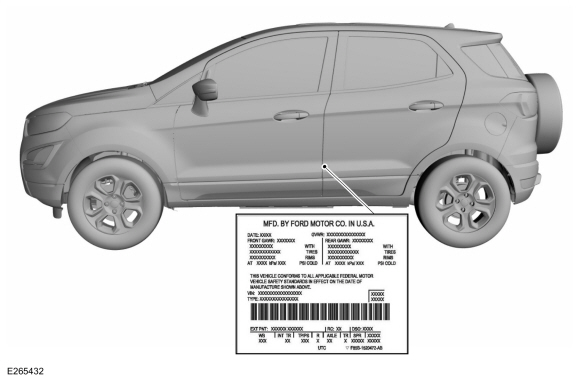
The VC label contains the manufacturer name, the month and year of manufacture, the certification statement and the VIN . It also includes GVW rating and tire information. If a vehicle requires replacement of the VC label and is 4 years old or less, an authorized dealer must submit the VIN to their respective regional office. The regional office will submit a web form to the assembly plant for the replacement label. Once the label has been printed, a representative from the regional office will deliver the label to the dealer and witness installation on the vehicle. If a vehicle is more than 4 years old and requires a replacement label, the dealer must submit a request to the Department of Motor Vehicles.
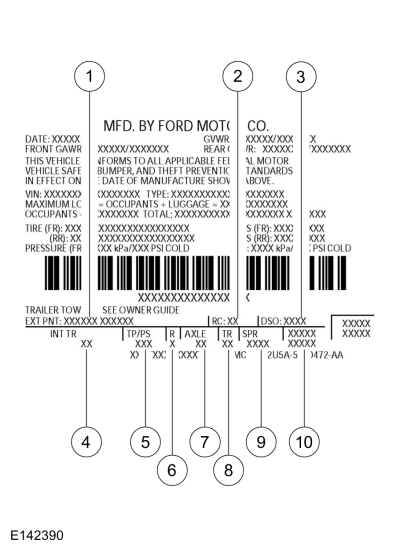
| Item | Description |
|---|---|
| 1 | Exterior paint code |
| 2 | Region code |
| 3 | Domestic special order code |
| 4 | Interior trim code |
| 5 | Tape/paint stripe code |
| 6 | Radio code |
| 7 | Axle code |
| 8 | Transmission code |
| 9 | Spring code |
| 10 | Powertrain calibration information |
Paint Code
Paint codes are listed as a 2-part code. The first set of paint code numbers/letters indicate the vehicle primary body color. The second set of letters/numbers (if applicable) indicate a 2-tone or accent body color. All paint codes are a base coat/clear coat finish.
- C7 - Canyon Ridge Metallic
- CJ - Luxe Yellow
- EE - Smoke Metallic
- FT - Blue Metallic
- G1 - Shadow/Absolute Black
- N6 - Lightning Blue Metallic
- PQ - Race Red Metallic
- RR - Ruby Red Metallic (tinted-clearcoat)
- TY - Moondust Silver
- UG - White Platinum Metallic (tri-coat)
- Z9 - Blue Candy Metallic (tinted-clearcoat)
- ZA - Diamond White
Interior Trim Codes
Interior trim codes are listed as a 2-part code. The first digit listed indicates the seat and fabric style. The second digit listed indicates the interior trim color.
Trim Codes
- 4 - Leather/Vinyl seats (Salerno/Salerno)
- M - Lanai cloth seats
- N - Dwell cloth seats
- S - Sportsers cloth seats (Sportster/Salerno)
Interior Trim Color Codes
- B - Ebony Black
- M - Medium Light Stone
Tape/Paint Stripe Codes
Tape and paint stripe codes do not apply.
Radio Codes
The following lists available radio codes:
- 4 - AM / FM stereo, mp3, AUX (Mexico market only)
- 6 - AM / FM stereo, SDARS (satellite digital audio receiver system) , navigation, SYNC
- 7 - Harman radio, SDARS (satellite digital audio receiver system), SYNC, navigation
- H - Radio (Mexico market only)
- L - AM / FM radio, SYNC3 (Mexico market only)
- N - AM / FM stereo, SYNC3
- P - AM / FM stereo, SDARS (satellite digital audio receiver system), SYNC3
Axle Type
The following lists the available axle ratios and associated codes:
- 3E - 3.44 ratio
- 3L - 3.51 ratio
- 3S - 4.56 ratio (Mexico market only )
Transmission Codes
Available transmissions are as follows:
- 5 - 5 Speed Manual
- 6 - 6 Speed Automatic (6F35 Mid-Range)
- 7 - 6 Speed Automatic (6F15)
Spring Codes
Spring codes are listed as a 2-part code. The first set of characters identify the front springs. The second set of characters identify the rear springs.
Front Springs
- Base part number - 5310
Rear Springs
- Base part number - 5560
Powertrain Calibration Information
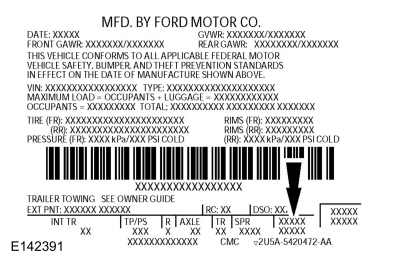
NOTE: Powertrain calibration information is limited to a maximum of 5 characters per line on the VC label. Because of this, calibration identification consisting of more than 5 characters will wrap to the second line on the VC label.
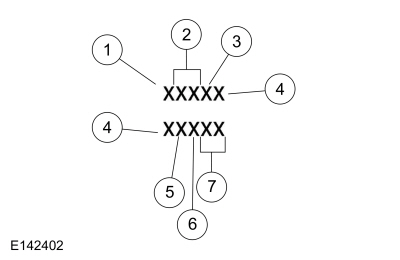
Powertrain calibration information is printed in the lower right corner of the VC label. Only the base calibration information is printed. Revision levels will not appear, however, they can be obtained through a scan tool using the most current software revision.
| Item | Description |
|---|---|
| 1 | Model year (year in which the calibration strategy was first introduced). |
| 2 | Vehicle code |
| 3 | Transmission code |
| 4 | Unique calibrations (designates different hardware to similar vehicles), example: tires or drive ratios |
| 5 | Fleet code (describes fleet to which the vehicle belongs), example: 6 - EVAP |
| 6 | Certification region (lead region where multiple regions are included in one calibration), example: A - U.S. federal |
| 7 | Revision level (will advance as revisions occur), obtained through scan tool |
Model Year
- M - 2021
Vehicle Code
- BW - EcoSport
Transmission Code
- 1 - Manual transmission
- 2 - Automatic transmission
Unique Calibration
The Emission/Corporate Average Fuel Economy/CO2 Compliance Department is responsible for assigning these calibration numbers. Unique identifications are assigned to cover similar vehicles to differentiate between tires, drive configurations, final drive ratios and other calibration-significant factors. These 2 characters are chosen by the analyst to provide identifiable information unique to each calibration. For example, using the number 2 to denote a 2- valve engine versus using the number 4 to denote a 4-valve engine provides an easily identifiable difference.
Fleet Coding
- 0 - Certification (U.S. 4K, final sale in export markets)
- 1 - Heavy duty gas engine/Dyno
- 2 - Fast Automobile Manufacturers' Association, U.S.
- 3 - Alternative durability protocol, U.S.
- 4 - Not assigned
- 5 - Not assigned
- 6 - EVAP
- 7 - Mileage accumulation aging endurance durability
- 8 - OBD
- 9 - Not assigned
Certification Region
- 5 - U.S. 50 states
- A - U.S. federal, including altitude, may include Canada and/or Mexico
- B - U.S. California standard, includes U.S. green states
- C - Canada
- D - China
- E - European Community - Austria, Belgium, Denmark, Finland, France, Germany, Greece, Ireland, Italy, Luxembourg, Netherlands, Portugal, Spain, Sweden and UK (United Kingdom)
- F - EEC (European Extended Community) - E-plus Croatia, Czech Republic, Estonia, Hungary, Norway, Poland, Romania, Russian Federation, Slovakia, Slovenia, Switzerland and Yugoslavia
- G - GCC (Gulf Cooperative Council) - Bahrain, Kuwait, Oman, Qatar, Saudi Arabia and UAE (United Arab Emirates)
- H - Hong Kong
- J - Japan
- K - Korea
- L - Malaysia
- M - Mexico
- N - New Zealand
- P - Australia
- Q - South America (Brazil)
- S - Singapore
- T - Taiwan
- U - South America (unleaded fuel regions)
- V - Vietnam
- X - Rest Of World
- Y - Military
- Z - Israel
Revision Level (not printed on label)
- 91-99 - Hardware and certification levels
- 01-04 - Preliminary levels
- 00 - Job 1 production (initial certification)
- 05-09 - Pre-job 1 revisions to calibrations
- 10-89 - Post-job 1 revisions to calibrations
- 0B - Durability test level
- BD - OBD intermediate level (pre-05)
Other information:
Ford Ecosport 2014-2025 Service and Repair Manual: General Procedures - Fuel Tank Draining
Draining WARNING: Before beginning any service procedure in this section, refer to Safety Warnings in section 100-00 General Information. Failure to follow this instruction may result in serious personal injury. With the vehicle in NEUTRAL, position it on a hoist. Refer to: Jacking and Lifting - Overview (100-02 Jacking and Lifting, Description and Operation..
Ford Ecosport 2014-2025 Service and Repair Manual: Description and Operation - Road/Roller Testing
Road or roller testing may be carried out for various reasons and a procedure detailing pre-test checks, engine starting and stopping, pre-driving checks, on-test checks and final checks to be completed on completion of the test is given below. Unless complete vehicle performance is being checked, the full road test procedure need not be carried out. Instead, those items particularly..



 205-153
(T80T-4000-W)
205-153
(T80T-4000-W)
 205-990
205-990